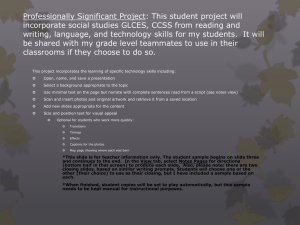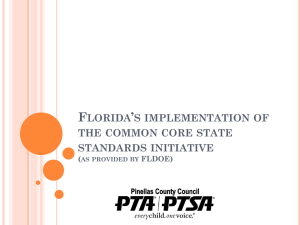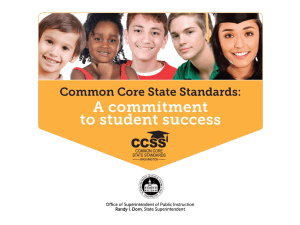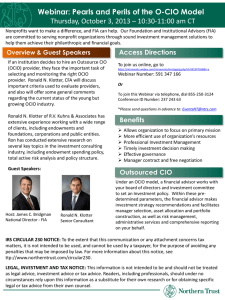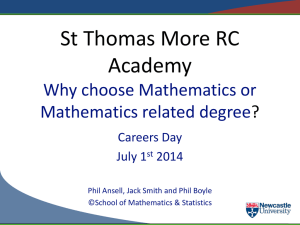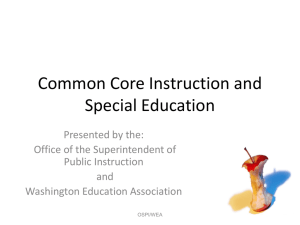CCSS Webinar Series Part 3, Systems Webinar for School District
advertisement
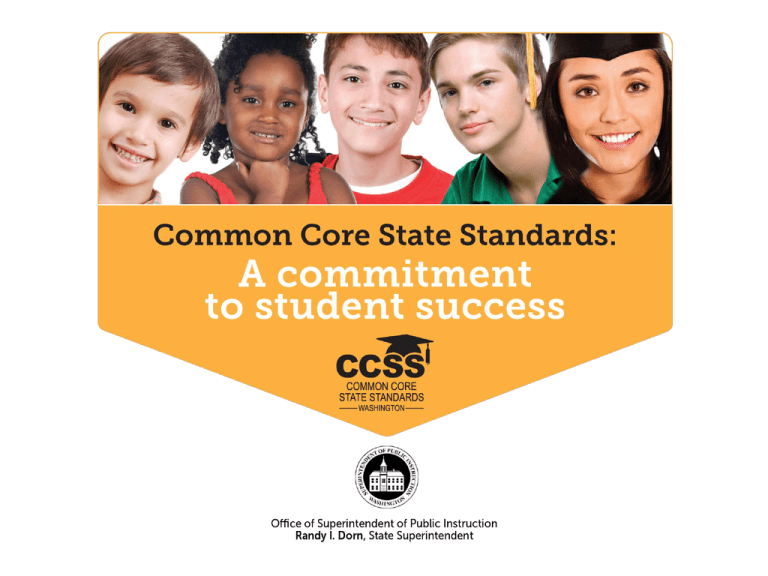
Common Core State Standards for Mathematics Webinar Series – Part three Office of Superintendent of Public Instruction Randy I. Dorn, State Superintendent Welcome! Agenda for today’s webinar… Vision for the state and highlights from previous webinar Statewide efforts to build capacity Classroom transition supports that will be available Smarter Balanced Assessment Consortium 3 OSPI CCSS Mathematics Webinar - Part 3 March 20, 2012 But First…About You We’d like to know a little about who is out there. Time for a poll. 4 OSPI CCSS Mathematics Webinar - Part 3 March 20, 2012 Implementing the Common Core State Standards in Washington State Our Vision: Every student will have access to the CCSS standards through high quality instruction aligned with the standards every day; and that all English language arts and mathematics teachers are prepared and receive the support they need to implement the standards in their classrooms every day. Our Purpose: To develop a statewide system with aligned resources that supports all school districts in their preparation of educators and students to implement the CCSS. This includes building system-wide capacity for sustained professional learning that can support CCSS implementation now and be applied to other initiatives in the future. Our Core Values: This vision can only occur through core values of clarity, consistency, collaboration, coordination, and commitment from classrooms, schools, and communities to the state level. 5 OSPI CCSS Mathematics Webinar - Part 3 March 20, 2012 Washington State Implementation Timeline August 2011 2010-11 2011-12 2012-13 2013-14 2014-15 Phase 1: CCSS Exploration Phase 2: Build Awareness & Begin Building Statewide Capacity Phase 3: Build Statewide Capacity and Classroom Transitions January 2012 Phase 4: Statewide Application and Assessment Ongoing: Statewide Coordination and Collaboration to Support Implementation 6 OSPI CCSS Mathematics Webinar - Part 3 March 20, 2012 Common Core State Standards for Mathematics A Review of Progressions, Shifts, Design, and Focus 7 OSPI CCSS Mathematics Webinar - Part 3 March 20, 2012 Content Progressions and Major Shifts Major Shifts Focus • Fewer big ideas --learn more • Learning of concepts is emphasized 8 Coherence • Articulated progressions of topics and performances that are developmental and connected to other progressions OSPI CCSS Mathematics Webinar - Part 3 Application • Being able to apply concepts and skills to new situations March 20, 2012 CCSS Design and Organization 9 OSPI CCSS Mathematics Webinar - Part 3 March 20, 2012 Critical Areas of Focus Grade K–2 3–5 6 7 8 10 Priorities in Support of Rich Instruction and Expectations of Fluency and Conceptual Understanding Addition and subtraction, measurement using whole number quantities Multiplication and division of whole numbers and fractions Ratios and proportional reasoning; early expressions and equations Ratios and proportional reasoning; arithmetic of rational numbers Linear algebra OSPI CCSS Mathematics Webinar - Part 3 March 20, 2012 Common Core State Standards for Mathematics Next Steps in Building Statewide Capacity 11 OSPI CCSS Mathematics Webinar - Part 3 March 20, 2012 Focusing on the Foundation… Washington’s Implementation Timeline & Activities 2010-11 2011-12 2012-13 2013-14 2014-15 Phase 1: CCSS Exploration Phase 2: Build Awareness & Begin Building Statewide Capacity Phase 3: Build Statewide Capacity and Classroom Transitions Phase 4: Statewide Application and Assessment Ongoing: Statewide Coordination and Collaboration to Support Implementation 12 OSPI CCSS Mathematics Webinar - Part 3 March 20, 2012 Implementation Partnerships Washington PLUS… Large School Districts Higher Education Statewide Education and Content Associations 13 OSPI CCSS Mathematics Webinar - Part 3 March 20, 2012 Begin Building Statewide Capacity CCSS Overview and Content-Specific Learning Opportunities 14 Opportunities in each ESD region for professional learning focused on Math and ELA CCSS – consistent content, no charge to attend. Time: Spring and summer 2012 OSPI CCSS Mathematics Webinar - Part 3 March 20, 2012 Common Core State Standards for Mathematics Classroom Transition Supports 15 OSPI CCSS Mathematics Webinar - Part 3 March 20, 2012 Standards for Mathematical Practice 16 Make sense of problems and persevere in solving them Reason abstractly and quantitatively Construct viable arguments and critique the reasoning of others Model with mathematics Use appropriate tools strategically Attend to precision Look for and make use of structure Look for and express regularity in repeated reasoning OSPI CCSS Mathematics Webinar - Part 3 March 20, 2012 Standards for Mathematical Practices Graphic 17 OSPI CCSS Mathematics Webinar - Part 3 March 20, 2012 Three-Year Transition Plan for Common Core State Standards for Mathematics by Grade Level 18 OSPI CCSS Mathematics Webinar - Part 3 March 20, 2012 Professional Development Plan CCSS-M Three-year transition plan focuses on one or two domain areas for each year. Domain of focus for year one aligns to the current testing of the MSP and EOC. Each year additional domains will be added, but the process can be repeated each year of the transition. 19 OSPI CCSS Mathematics Webinar - Part 3 March 20, 2012 20 OSPI CCSS Mathematics Webinar - Part 3 March 20, 2012 Professional Development Plan CCSS-M Step 0: Introduction and Overview of the Common Core State Standards for Mathematics (CCSS-M) (approx. 1-2 hours) 21 OSPI CCSS Mathematics Webinar - Part 3 March 20, 2012 Professional Development Plan CCSS-M Step One: Decoding the Language of the Common Core State Standards for Mathematics (CCSS-M) – (approx. 3 hours) During this training, educators will dig into the language of the standards and examine the student expectations within the content standards. 22 OSPI CCSS Mathematics Webinar - Part 3 March 20, 2012 What does this mean? The 2008 standards asks students to: 6. 3.C Solve single- and multi-step word problems involving ratios, rates, and percents, and verify solutions. 23 OSPI CCSS Mathematics Webinar - Part 3 March 20, 2012 In the Common Core State Standards students will need to: 6.RP.3 Use ratio and rate reasoning to solve real-world and mathematical problems, e.g., by reasoning about tables of equivalent ratios, tape diagrams, double number line diagrams, or equations. 24 OSPI CCSS Mathematics Webinar - Part 3 March 20, 2012 What does this mean? 6.RP.3 a. Make tables of equivalent ratios relating quantities with whole-number measurements, find missing values in the tables, and plot the pairs of values on the coordinate plane. Use table to compare ratios. b. Solve unit rate problems including those involving unit pricing and constant speed. c. Find a percent of a quantity as a rate per 100; solve problems involving finding the whole, given a part and the percent. Use ratio reasoning to convert measurement units; manipulate and transform units appropriately when multiplying or dividing quantities. 25 OSPI CCSS Mathematics Webinar - Part 3 March 20, 2012 An Example For every 5 cups grape juice mix in 2 cups peach juice. http://math.arizona.edu/~ime/progressions/ 26 OSPI CCSS Mathematics Webinar - Part 3 March 20, 2012 http://math.arizona.edu/~ime/progressions/ 27 OSPI CCSS Mathematics Webinar - Part 3 March 20, 2012 Professional Development Plan CCSS-M Step Two: Deepening Your Understanding of the Mathematics in the Common Core State Standards (CCSS–M) (approx. 4 hours) Educators will further unpack the standards by looking at examples and connecting content standards to the Standards of Mathematical Practices. 28 OSPI CCSS Mathematics Webinar - Part 3 March 20, 2012 Your Turn A runner ran 20 miles in 150 minutes. If she runs at that speed, a) How long would it take her to run 6 miles? b) How far could she run in 15 minutes? c) How fast is she running in miles per hour? d) What is her pace in minutes per mile? http://illustrativemathematics.org/ 29 OSPI CCSS Mathematics Webinar - Part 3 March 20, 2012 Professional Development Plan CCSS-M Step Three: Connecting the Common Core State Standards for Mathematics (CCSS-M) to Instructional Materials – (approx. 1.5 hours) Educators will have an opportunity to link the Common Core State Standards for Mathematics to instructional materials and other resources. Teachers will examine the cognitive complexity of tasks within their materials and consider the amount of scaffolding that is appropriate. 30 OSPI CCSS Mathematics Webinar - Part 3 March 20, 2012 Begin Building Statewide Capacity CCSS Overview and Content-Specific Learning Opportunities 31 Opportunities in each ESD region for professional learning focused on Math and ELA CCSS – consistent content, no charge to attend. Time: Spring and summer 2012 OSPI CCSS Mathematics Webinar - Part 3 March 20, 2012 SMARTER Balanced Assessment System New Assessment System: What We Know So Far A National Consortium of States • 28 states representing 44% of K-12 students • 21 governing, 7 advisory states • Washington state is fiscal agent March 20, 2012 OSPI CCSS Mathematics Webinar - Part 3 33 Next Generation Assessments • More rigorous tests measuring student progress toward “college and career readiness” • Grades 3-8 and High School • Have common, comparable scores across member states, and across consortia • Provide achievement and growth information to help make better educational decisions and professional development opportunities • Assess all students, except those with “significant cognitive disabilities” • Administer online, with timely results • Use multiple measures Source: Federal Register / Vol. 75, No. 68 / Friday, April 9, 2010 pp. 18171-85 March 20, 2012 OSPI CCSS Mathematics Webinar - Part 3 34 A Balanced Assessment System: ELA and Math --Grades 3-8 and High School Common Core State Standards specify K-12 expectations for college and career readiness Summative assessments Benchmarked to college and career readiness Teachers and schools have information and tools they need to improve teaching and learning Teacher resources for formative assessment practices to improve instruction March 20, 2012 All students leave high school college and career ready Interim assessments Flexible, open, used for actionable feedback OSPI CCSS Mathematics Webinar - Part 3 35 Grades Supported Through Smarter Balanced Grades 8 3 10 9 11 12 March 20, 2012 Summative Interim (Optional) Formative Tools and Professional Learning (Optional) ✔ ✔ ✔ 1-2 Performance Tasks as Required to Cover CCSS ✔ ✔ ✔ EOC and Comprehensive ✔ ✔ EOC and Comprehensive Optional ✔ EOC and Comprehensive OSPI CCSS Mathematics Webinar - Part 3 ✔ 36 A Balanced Assessment System March 20, 2012 OSPI CCSS Mathematics Webinar - Part 3 38 Time and format • Summative: For each content area - ELA & Math – Computer Adaptive Testing • Selected response (MC), Constructed Response (openended), Technology enhanced (e.g., drag and drop, video clips, limited web-interface) – Performance Tasks (like our CBAs) • Up to 2 per content area in grades 3-8 • Up to 6 per content area in High School March 20, 2012 OSPI CCSS Mathematics Webinar - Part 3 39 Time and format • Summative: - Administration window is last 12 weeks of school - For each content area - ELA & Math – Shorter option for states (~3 hours ELA, ~2 hours Math) • Scale score on comprehensive test (met/not met determination) – Longer option for states (~5 hours ELA, ~3 hours Math) • Able to report data on claims for individual students March 20, 2012 OSPI CCSS Mathematics Webinar - Part 3 40 Time and format • Interim assessments – Can be used as often as needed – Can be customized by districts/schools • To focus on selected strands • To clone summative test – Will use Computer Adaptive Technology – Released items from summative item bank March 20, 2012 OSPI CCSS Mathematics Webinar - Part 3 41 Washington’s Testing System Transition Current Testing System Reading and Math: Grades 3–8 and 10 Writing: Grades 4, 7, 10 Science: Grades 5, 8, 10 SBAC/CCSS Testing System English/Language Arts and Math: Grade 3–8 and 11* Science exams are required under ESEA but are not included in SBAC *11th grade to measure college and career readiness. We are working with higher ed to explore the possible use of these measures as an alternative for college placement (or entrance). () March 20, 2012 OSPI CCSS Mathematics Webinar - Part 3 42 Still to be worked out: System Development and Implementation Details • • • • • • • How can teachers volunteer for item writing? How can schools volunteer for limited pilot? Will everyone have to participate in the field test? What retake opportunities will there be? Mandatory testing schedule? Will translations be available? What tools will be allowed (e.g., calculator, highlighter, thesaurus)? • What accommodations will be allowed? March 20, 2012 OSPI CCSS Mathematics Webinar - Part 3 43 Still to be worked out: System Development and Implementation Details • What technology infrastructure will be required (survey for districts coming this spring)? • What if there are not enough computers? • What will parent and classroom reports look like? • What happens to the Smarter Balanced Consortium at the end of the grant (Oct 2014)? March 20, 2012 OSPI CCSS Mathematics Webinar - Part 3 44 Still to be worked out: Washington’s Policy Discussion… • Will 11th grade exam be used for graduation (exit exam) in Washington? • If these exams are our exit exams what will the CAA options be? • Will the Summative SBAC test replace our End of Course exams or will SBAC have End of Course exams too? • How will Washington’s science tests mesh with these tests? March 20, 2012 OSPI CCSS Mathematics Webinar - Part 3 45 Find Out More: www.SmarterBalanced.org State Contact: Robin.Munson@k12.wa.us March 20, 2012 OSPI CCSS Mathematics Webinar - Part 3 46 Key next steps and additional resource for Phase 2 – Spring & Summer 2012 Continue Building Statewide Awareness…(http://k12.wa.us/CoreStandards/default.aspx) CCSS Webinar Series, web resources (http://www.k12.wa.us/CoreStandards/UpdatesEvents.aspx#Webinar ) CCSS Overview Presentations and Support (OSPI and ESD partners) Continue Statewide Coordination and Collaboration Convene statewide professional learning content associations to coordinate statewide PD offerings for FALL 2012 Higher education coordination WA Assoc. Colleges of Teacher Education (April) PESB Endorsement Competency Revision Process HECB / SBAC – “Core to College” project Begin Building Statewide Capacity… In collaboration with 9 regional ESDs and other state partners: CCSS Overview and Content-Specific Learning Opportunities Establish CCSS District Implementation Network Pilot Project 47 OSPI CCSS Mathematics Webinar - Part 3 March 20, 2012 Washington CCSS Upcoming Events 2011-12 OSPI Quarterly Webinar Series (September and January WA State PTA Conference – May 4-6, 2012 ESD Content Leader PD dates To Be Determined (will be webinars and materials posted at http://k12.wa.us/CoreStandards/UpdatesEvents.aspx ) : March 20, 3:30 – 4:30 – Mathematics March 21, 3:30 – 4:30 – English Language Arts May 23, 10:30 – 11:30 – District/Building Leaders May 29, 3:30 – 4:30 – Mathematics May 31, 3:30 – 4:30 – English Language Arts posted on OSPI CCSS Web Site: http://k12.wa.us/Corestandards/default.aspx). 48 OSPI CCSS Mathematics Webinar - Part 3 March 20, 2012 Ways to keep in touch http://k12.wa.us/CurriculumInstruct/news.aspx 49 OSPI CCSS Mathematics Webinar - Part 3 March 20, 2012 Washington State Educational Service Districts Math Coordinator Network Team 2011-2012 ESD Location Math Coordinator Phone NEW ESD 101 Spokane Erik Wolfrum (509) 789-3551 ESD 105 Yakima Ann Sipe (509) 853-1100 ESD 112 Vancouver Sue Bluestein (360) 750-7500, Ext. 143 ESD 113 Olympia Heather Dorsey (360) 464-6704 Olympic ESD 114 Bremerton Katy Absten (360) 782-5061 Puget Sound ESD 121 Renton Sandy Christie (425) 917-7934 ESD 123 Pasco Cathey Bolson (509) 544-5736 North Central ESD 171 Wenatchee Mary Jane Ross (509) 667-3633 Northwest ESD 189 Anacortes Jeanette Grisham (360) 299-4716 Email ewolfrum@esd101.net ann.sipe@esd105.org sue.bluestein@esd112.org hdorsey@esd113.org kabsten@oesd.wednet.edu schristie@psesd.org cbolson@esd123.org maryr@ncesd.org jgrisham@nwesd.org Cheryl Lydon Statewide ESD Math/Science Director 425-917-7866 CSS Webinar Series Part 3: Mathematics clydon@psesd.org Thank you. Common Core Questions: Email: corestandards@k12.wa.us OR Greta Bornemann, OSPI CCSS Project Lead, E-mail: Greta.Bornemann@k12.wa.us 51 OSPI CCSS Mathematics Webinar - Part 3 March 20, 2012
